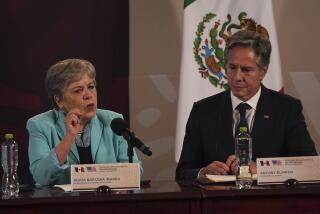Backing for Reagan Peace Plan Reported
- Share via
SANTA BARBARA — President Reagan has telephoned several Latin American leaders and successfully persuaded them to support his Nicaraguan peace plan, his national security adviser said Wednesday.
“He has talked to each of the Contadora leaders in the last few days,” said Robert C. McFarlane, referring to officials of Panama, Venezuela, Colombia and Mexico--the Contadora Group that has been seeking a negotiated peace in Central America.
Asked by reporters whether the President has received assurance of specific support from the Contadora leaders, McFarlane replied: “That is what I’ve just said--from Venezuela, from Colombia, from Panama. And then in a less effusive sense, from Mexico as well.”
Foreign officials, however, seemed to interpret the extent of Reagan’s success somewhat differently. A deputy foreign minister in Panama called Reagan’s plan “a matter of interference in the internal affairs of a Central American country.” And a representative of Mexico said his country does not endorse the plan.
An Administration official said that Reagan has no current plans for waging an all-out public relations blitz to sell Congress on the move. The plan calls for the United States to spend $14 million earmarked as aid to the Nicaraguan rebels, called contras , for “humanitarian” purposes--not arms--so long as the leftist Sandinista government negotiates with the U.S.-supported rebels.
The official, who requested anonymity, said that only one top White House official--conservative communications director Patrick J. Buchanan--is arguing that Reagan should turn fully to his renowned oratorical skills in this uphill effort. Others, notably McFarlane and longtime Reagan confidant Michael K. Deaver, say the President should use scarce time between now and congressional votes to “arm-twist” members of Congress individually.
The official said Reagan is banking on the Contadora leaders to put pressure on Nicaragua to accept his plan. The Sandinista regime has flatly rejected it. However, Reagan believes Contadora approval and the possibility of a more flexible attitude by the Managua regime could in turn influence Congress, the official said.
He acknowledged that sentiment is currently against the President in the Senate, which votes April 23, and in the House, which will vote on or before April 30.
Asked specifically about Mexico, McFarlane said he did not think that President Miguel De la Madrid showed any reluctance to accept Reagan’s plan.
After Reagan called De la Madrid on Tuesday, the Mexican government issued a communique saying that the White House proposal “can constitute a step forward.” But a Mexican Embassy official in Washington said De la Madrid’s statement “was not intended to be an endorsement of the Reagan plan.”
Mexico’s position, he said, is that it is up to the Sandinistas to work out their conflicts with the Nicaraguan rebels without outside pressure--including that of the United States.
In Panama, Deputy Foreign Minister Jose Maria Cabrera said Reagan’s plan is not part of the agenda for a Contadora meeting there, which opens today. Cabrera said he views Reagan’s plan as interference in Central American affairs.
More to Read
Sign up for Essential California
The most important California stories and recommendations in your inbox every morning.
You may occasionally receive promotional content from the Los Angeles Times.











